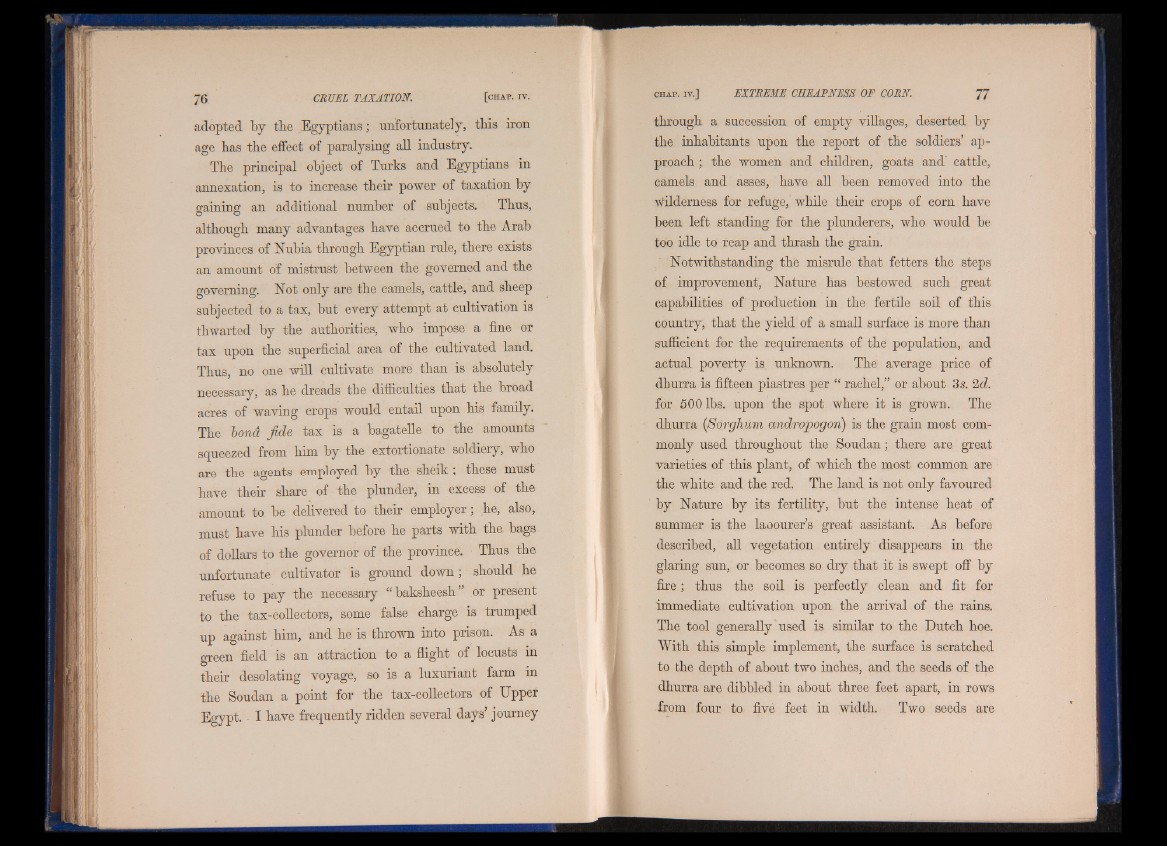
adopted by tbe Egyptians ; unfortunately, tbis iron
age has tbe effect of paralysing all industry.
The principal object of Turks and Egyptians in
annexation, is to increase tbeir power of taxation by
gaining an additional number of subjects. Thus,
although many advantages have accrued to tbe Arab
provinces of Nubia through Egyptian rule, there exists
an amount of mistrust between tbe governed and tbe
governing. Not only are tbe camels, cattle, and sheep
subjected to a tax, but every attempt at cultivation is
thwarted by tbe authorities, who impose a fine or
tax upon tbe superficial area of tbe cultivated land.
Thus, no one will cultivate more than is absolutely
necessary, as be dreads tbe difficulties that tbe broad
acres of waving crops would entail upon bis family.
Tbe honct fide tax is a bagatelle to tbe amounts
squeezed from him by tbe extortionate soldiery, wbo
are tbe agents employed by tbe sheik ; tbese must
have tbeir share of tbe plunder, in excess of the
amount to be delivered to tbeir employer ; be, also,
must have bis plunder before be parts with tbe. bags
of dollars to tbe governor of tbe province, Thus tbe
unfortunate cultivator is ground down; should be
refuse to pay tbe necessary “baksheesh” or present
to tbe tax-collectors, some false charge is trumped
up against him, and be is thrown into prison. As a
green field is an attraction to a flight of locusts in
tbeir desolating voyage, so is a luxuriant farm in
the Soudan a point for tbe tax-collectors of Upper
Egypt. - I have frequently ridden several days’ journey
through a succession of empty villages, deserted by
tbe inhabitants upon tbe report of tbe soldiers’ approach
; tbe women and children, goats and cattle,
camels and asses, have all been removed into tbe
wilderness for refuge, while tbeir crops of corn have
been left standing for tbe plunderers, wbo would be
too idle to reap and thrash tbe grain.
’ Notwithstanding the misrule that fetters tbe steps
of improvement, Nature has bestowed such great
capabilities of production in tbe fertile soil of tbis
country, that the yield of a small surface is more than
sufficient for tbe requirements of the population, and
actual poverty is unknown. The average price of
dburra is fifteen piastres per “ rachel,” or about 3s. 2d.
for 500 lbs. upon tbe spot where it is grown. Tbe
dburra (Sorghùm andropogon) is tbe grain most commonly
used throughout tbe Soudan ; there are great
varieties of tbis plant, of which tbe most common are
tbe white and tbe red. The land is not only favoured
by Nature by its fertility, but tbe intense beat of
summer is tbe laoourer’s great assistant. As before
described, all vegetation entirely disappears in tbe
glaring sun, or becomes so dry that it is swept off by
fire ; thus the soil is perfectly clean and fit for
immediate cultivation upon the arrival of tbe rains.
Tbe tool generally used is similar to tbe Dutch hoe.
With tbis simple implement, tbe surface is scratched
to tbe depth of about two inches, and tbe seeds of tbe
dburra are dibbled in about three feet apart, in rows
from four to fivè feet in width. Two seeds are